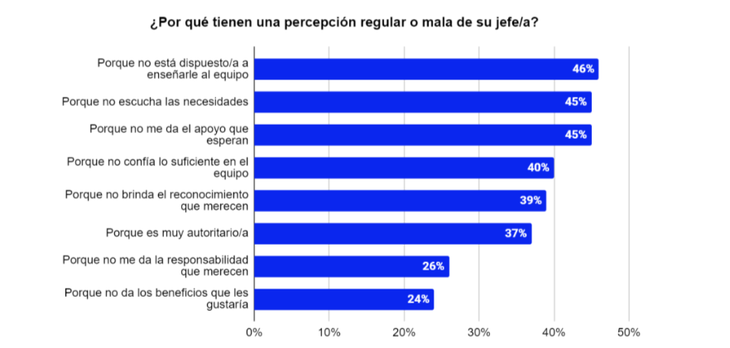70% of Argentines have once thought about quitting their job because they do not have a good relationship with their boss. That was the conclusion of the study of Leaders or bosses carried out by Bumeran. Furthermore, there is an increase in 18 percentage points Regarding the answer to this question in the previous edition of the study: in 2022, 52% of respondents had experienced this situation.
Bad relationship with the boss: the conclusions of the study
The tendency to resign due to a bad relationship with the boss is repeated in other countries in the regionIn Chile, 77% indicated that they had once thought about quitting their job because of their relationship with their superiors; 65% in Panama; 60% in Peru; and 50% in Ecuador.
“The study explores how working people in Argentina perceive the bond with their leaders to be, and how this could influence their performance and job continuity. The results consolidated the finding from the previous edition of the research: the majority of participants, 70%, considered quitting their job due to their relationship with their bosses. Not only did we observe the same majority trend but it also increased by 18 percentage points. The role of leaders is increasingly decisive for the development of a healthy work environment and the permanence of talent in organizations. The new generations need leaders, not bosses,” explains Federico Barni, CEO of Jobint.
Leaders or bosses is a Bumeran study in which 5,026 workers and HR specialists from Argentina, Chile, Ecuador, Panama and Peru participated. The research explores leadership within the workplace and its effects.
boomerang333.PNG
What perception do working people have about their bosses?
56% of talents describe their relationship with their superiors as good or very good; while for 44% it is average or bad. Although the positive perception continues to be the majority, it had a decrease compared to 2022, when it was 70%.
Among those who have a negative perception, 46% mention that their boss was not willing to teach the team; 45% indicate that they did not listen to their needs; and another 45% indicate that it did not provide the support they expected.
In relation to the most appreciated qualities in a boss, 64% highlight contributing to the personal and professional growth of team members; 63% highlight the importance of listening to needs; and 54% value effective communication and recognition of achievements.
bossboomeran.PNG

9 out of 10 talents believe they have leadership qualities
89% of working people in Argentina consider they have the necessary qualities to become a leader. However, it is the country in the region where the fewest people consider they have this ability: in Peru 95% believe they can be a leader; in Chile, 93%; and in Panama and Ecuador, 92%.
Would you like the opportunity to serve as a leader?? 90% say yes, compared to 10% who prefer to avoid it.
Among those who want the opportunity to lead, 66% want to do so to contribute to the growth and success of the company; another 66% to improve working conditions and the work environment for all; and 63% to guide and support others in their professional development.
What does a leader have to have?
The cThe ability to inspire and motivate is essential to being a good leader. 80% of Human Resources professionals consider that the ability to inspire and motivate their team is a fundamental characteristic that a good leader must possess; while 74% believe that it is the ability to communicate clearly and effectively; and 73% highlight the clear vision to establish goals and objectives. Do you consider that it is important for the functioning of the organization that people in hierarchical positions are good leaders? 98% affirm that this is the case; while only 2% do not believe it is necessary.
More than half of experts consider that the leadership in their organization is average or poor
54% of Human Resources specialists consider that the leadership in their organization is average or deficient; while for 46% it is excellent or good. The negative trend is repeated in Chile with 71% and in Panama with 58%; while in Peru with 48% and in Ecuador with 32% the majority have a positive perception of the leaders of their organization.
Source: Ambito




